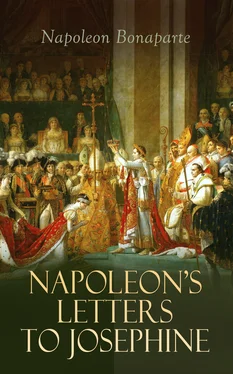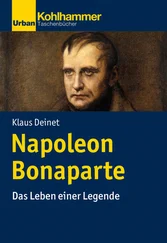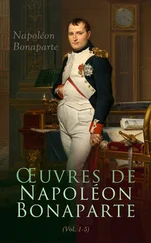Milan.
I am at Milan, with a very bad cold. I can't stand rain, and I have been wet to the skin for several hours, but all goes well. I don't persuade you to come here. I shall be home in a month.
I trust to find you flourishing. I am just starting for Pavia and Stradella. We are masters of Brescia, Cremona, and Placentia.
Kindest regards. Murat has borne himself splendidly.
June 5th. —Massena gives up Genoa, but leaves with all the honours of war.
June 7th. —Lannes takes Pavia, 350 cannon, and 10,000 muskets.
June 9th.—Battle of Montebello. Bonaparte defeats Austrians, who lose 8000 men.
June 14th.—Bonaparte wins Marengo, but loses Desaix—"the man I loved and esteemed the most." In his bulletin he admits the battle at one time was lost, until he cried to his troops "Children, remember it is my custom to sleep upon the battlefield." He mentions the charges of Desaix and Kellermann, and especially eulogises the latter—a fact interesting on account of the false statements made of his ignoring it. In the bulletin of June 21st he blames the "punic faith" of Lord Keith at Genoa, a criticism the Admiral repaid with usury fifteen years later.
June 14th. —Assassination of Kléber, in Egypt.
June 16th.—Convention of Alessandria between Bonaparte and Melas; end of the "Campaign of Thirty Days."
June 19th. —Moreau defeats Kray at Hochstedt, and occupies Ulm.
June 23rd. —Genoa re-entered by the French.
June 26th.—Bonaparte leaves Massena in command of the Army of Reserve, now united with the Army of Italy.
July 3rd.—The First Consul is back in Paris unexpectedly—not wishing triumphal arches or such-like "colifichets" In spite of which the plaudits he receives are very dear to him, "sweet as the voice of Josephine."
September 5th. —Vaubois surrenders Malta to the English, after two years' blockade.
September 15th. —Armistice between France and Austria in Germany.
September 30th. —Treaty of Friendship and Commerce between France and U.S.—agreed that the flag covers the goods.
October 3rd. —To facilitate peace King George renounces his title of King of France.
November 12th. —Rupture of Armistice between France and Austria.
December 3rd. —Moreau wins the battle of Hohenlinden (Austrian loss, 16,000 men, 80 guns; French 3000).
December 20th. —Moreau occupies Lintz (100 miles from Vienna).
December 24th.—Royalist conspirators fail to kill Bonaparte with an infernal machine.
December 25th. —Armistice at Steyer between Moreau and Archduke Charles (sent for by the Austrians a fortnight before as their last hope).
Table of Contents
"The peace of Amiens had always been regarded from the side of England as an armed truce: on the side of Napoleon it had a very different character.... A careful reader must admit that we were guilty of a breach of faith in not surrendering Malta. The promise of its surrender was the principal article of the treaty."
England and Napoleon in 1803.
(Edited for the R. Hist. S. by Oscar Browning, 1887.)
JOSEPHINE'S TWO VISITS TO PLOMBIÈRES,
1801 AND 1802.
Events of 1801.
January 1st. —Legislative Union of Great Britain and Ireland.
January 3rd. —French under Brune occupy Verona, and
January 8th. —Vicenza.
January 11th. —Cross the Brenta.
January 16th. —-Armistice at Treviso between Brune and the Austrian General Bellegarde.
February 9th. —Treaty of Luneville, by which the Thalweg of the Rhine became the boundary of Germany and France.
March 8th. —English land at Aboukir.
March 21st. —Battle of Alexandria (Canopus). Menou defeated by Abercromby, with loss of 2000.
March 24th. —The Czar Paul is assassinated.
March 28th. —Treaty of Peace between France and Naples, who cedes Elba and Piombino.
April 2nd. —Nelson bombards Copenhagen.
May 23rd. —General Baird lands at Kosseir on the Red Sea with 1000 English and 10,000 Sepoys.
June 7th. —French evacuate Cairo.
July 1st. —Toussaint-Louverture elected Life-Governor of St. Domingo. Slavery abolished there. The new ruler declares, "I am the Bonaparte of St. Domingo, and the Colony cannot exist without me;" and heads his letters to the First Consul, "From the First of the Blacks to the First of the Whites."
July 15th.—Concordat between Bonaparte and the Pope, signed at Paris by Bonaparte, ratified by the Pope (August 15th).
August 4th. —Nelson attacks Boulogne flotilla and is repulsed.
August 15th. —Attacks again, and suffers severely.
August 31st. —Menou capitulates to Hutchinson at Alexandria.
September 29th. —Treaty of Peace between France and Portugal; boundaries of French Guiana extended to the Amazon.
October 1st. —Treaty between France and Spain, who restores Louisiana. Preliminaries of Peace between France and England signed in London.
October 8th. —Treaty of Peace between France and Russia.
October 9th. —And between France and Turkey.
December 14th. —Expedition sent out to St. Domingo by the French under General Leclerc.
No. 1.
To Josephine, at Plombières.
Paris the "27" ..., 1801.
The weather is so bad here that I have remained in Paris. Malmaison, without you, is too dreary. The fête has been a great success; it has rather tired me. The blister they have put on my arm gives me constant pain.
Some plants have come for you from London, which I have sent to your gardener. If the weather is as bad at Plombières as it is here, you will suffer severely from floods.
Best love to "Maman" and Hortense.
Bonaparte.
Events of 1802.
January 4th.—Louis Bonaparte marries Hortense Beauharnais, both unwilling.
January 9th.—The First Consul, with Josephine, leaves for Lyons, where,
January 25th.—He remodels the Cisalpine Republic as the Italian Republic, under his Presidency.
March 25th. —Treaty of Amiens signed in London. French lose only Ceylon and Trinidad. Malta to be restored to the Order of Knights, reconstituted.
May 7th. —Toussaint surrenders to Leclerc.
May 19th. —Institution of the Legion of Honour.
No. 2.
To Josephine, at Plombières.
Malmaison, June 19, 1802.
I have as yet received no news from you, but I think you must already have begun to take the waters. It is rather dull for us here, although your charming daughter does the honours of the house to perfection. For the last two days I have suffered slightly from my complaint. The fat Eugène arrived yesterday evening; he is very hale and hearty.
I love you as I did the first hour, because you are kind and sweet beyond compare.
Hortense told me that she was often writing you.
Best wishes, and a love-kiss.—Yours ever,
Bonaparte.
No. 3.
To Josephine, at Plombières.
Malmaison, June 23, 1802.
My Good Little Josephine ,—Your letter has come. I am sorry to see you have been poorly on the journey, but a few days' rest will put you right. I am very fairly well. Yesterday I was at the Marly hunt, and one of my fingers was very slightly injured whilst shooting a boar.
Hortense is usually in good health. Your fat son has been rather unwell, but is getting better. I think the ladies are playing "The Barber of Seville" to-night. The weather is perfect.
Читать дальше












